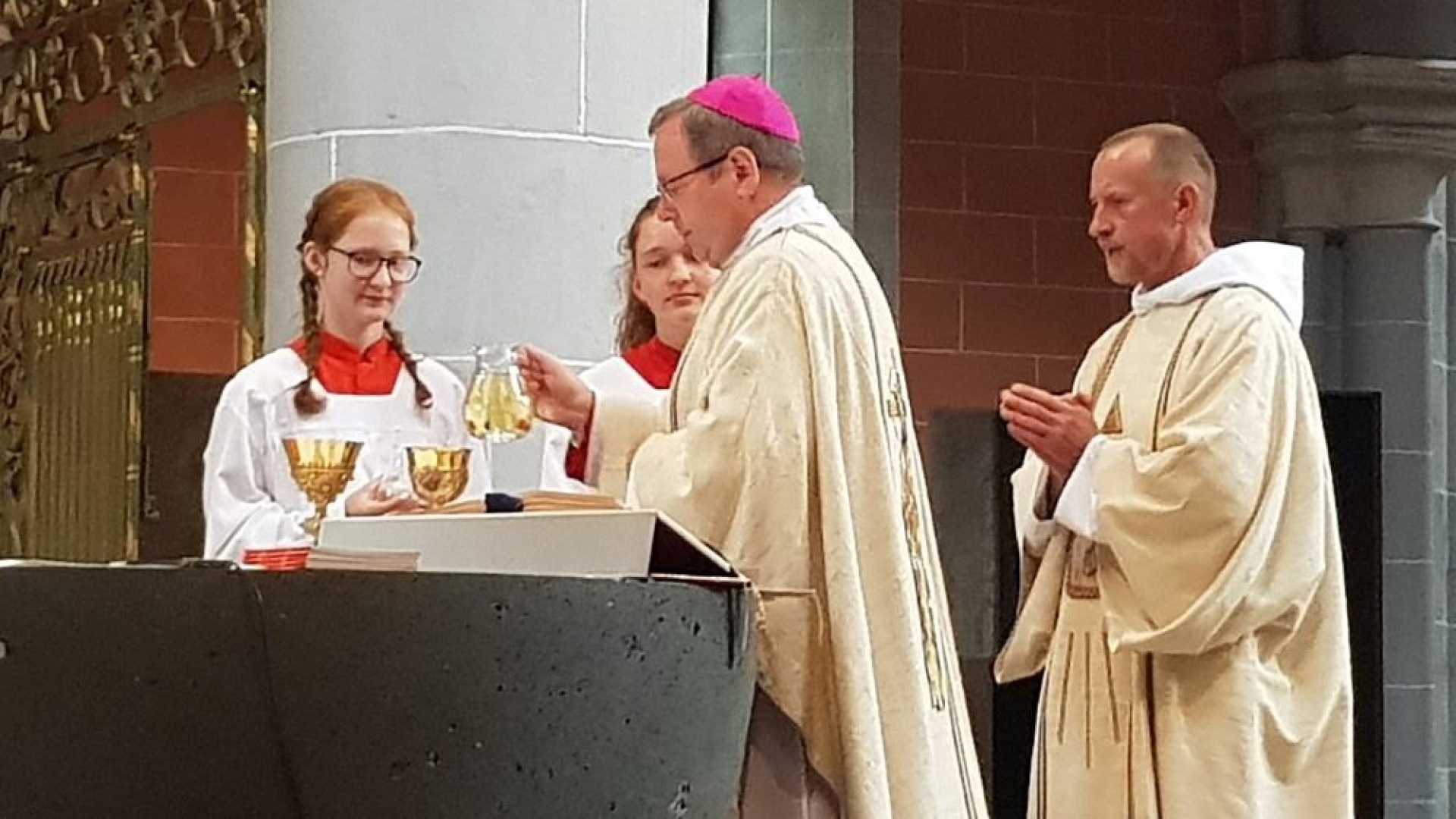Bishop Georg Bätzing and the German Schism

The German episcopate normally meets twice a year. A fall session in Fulda in September; and a spring session in an episcopal city that changes every year. For the first time, due to health restrictions, this second session was held by videoconference, on February 23-25, 2021.
At the end of this conference, and according to custom, the president of the German Bishops’ Conference (DBK), Msgr. Bätzing, Bishop of Limburg, presented the summary text given to journalists during a press conference.
A Smiling “Bulldozer”
The Bishop of Limbourg possesses a presentation and a roundness that contrasts somewhat with his predecessor, Cardinal Reinhard Marx. He readily declares himself as “conservative.” But all this is just a facade, Bishop Bätzing leads the Church of Germany with determination in the schism in formation.
Three points should be kept in mind about the German bishops’ document and about the presentation of it that was made.
A Structural Change in the Church
The first point concerns the transformation desired and displayed by the Synodal Path, of the structure of the Church, in particular of her judicial system, as well as of the participation of all the faithful in the administration, in various ways.
In this context, Bishop Bätzing spoke of “the creation of reassessment commissions, considerations aimed at amending the Church’s code of criminal procedure, establishing its own criminal courts and reforming the administrative jurisdiction of the Church. These considerations are very advanced and must now be coordinated with Rome.”
If we follow the movement of the Synodal Path as it has unfolded so far, it means that Rome only has to endorse the pseudo-theological rantings of the German bishops.
The point is driven home when the document quietly asserts that “in group discussions we, the bishops, have also reflected on the need and the possibility of changing the living tradition of the Church, bringing up concrete topics such as the ‘role of women’ and ‘homosexuality,’ among others, which are dealt with in the Synodal Path.”
“Changing the living tradition of the Church” is the goal. After having transformed the concept of the Tradition of the Church, by attaching to it the dangerous adjective ‘living,’ it is now accepted, at least for the German bishops, that it must be evolutionary, and that this evolution could be directed by the bishops. What remains of the concept of Tradition? Nothing, absolutely nothing.
The Church is considered equal to societies founded by men, and whose various elements can be manipulated, in defiance of her Founder, God Himself, Christ Jesus, who gave her a divine constitution. However, the German bishops seem above divine laws.
Ecumenical Change
This development must therefore renew the Church, but this can only be done in union with “other Churches.” In effect, the document says: “We are very aware that we can only achieve this at the ecumenical level, with Christians of other confessions.”
In other words, the Church must walk hand in hand with Protestant heretics, to find a new form, a new constitution, which is adapted to our contemporary times. If one could still doubt the schismatic, even heretical, spirit of the Synodal Path, it seems that this is no longer allowed.
Intercommunion
One of the items discussed among the German bishops was a document from the Ecumenical Working Group of Protestant and Catholic Theologians, “Together at the Lord’s Table,” which has already generated much ink.
Let us recall that the person in charge of this group, on the Catholic side, is Bishop Bätzing himself. He defended this text in front of his colleagues in the episcopate at the last autumn session of the DBK, because of a letter from Cardinal Koch, president of the Pontifical Council for the Promotion of Christian Unity, who attacked it.
Resistance continues on this text. In short, the German bishops argue that the Roman objections are irrelevant, or at least not sufficiently substantiated. Obviously, the authoritative argument does not convince them. Especially since they have given themselves the mission of changing the living tradition of the Church.
Bishop Bätzing quietly affirmed during the press conference that he would not refuse Holy Communion to a Protestant who asked for it. In doing so, he imagines himself being in agreement with the documents of the popes.
He continues: “It is a practice that is done every Sunday in our parishes, and this practice, I do too.” He therefore does not reprimand any priest who does the same.
He nuances it a little by saying that it is not possible to give Protestants a general invitation to celebrate the Eucharist, because from a Catholic perspective, this presupposes an ecclesial communion. “It does not yet exist,” adds Bishop Bätzing.
However, he concludes, the decision of the conscience of an individual must be respected now, regardless of this communion.
Thus, the ultimate arbiter of a liturgical act, with major canonical and above all theological implications, is conscience. Not the divine law, nor the ecclesiastical law which must be erased.
So what about the administration of communion to any person present, excommunicated, Buddhist, or Muslim, if his conscience calls for it? It is undoubtedly already in the drawers of the schismatic German bishops who are working on a new status for homosexuality in the Church.
As a reminder, on May 25, 2018, the Congregation for the Doctrine of the Faith rejected a document from the German bishops which wanted to introduce systematic Eucharistic hospitality for the Protestant spouse of a Catholic. This text is available here.
Related links
(Sources : Infocatolica/katolisch.de/DBK.de – FSSPX.Actualités)
Illustration : Christian Pulfrich, CC BY-SA 4.0, via Wikimedia Commons